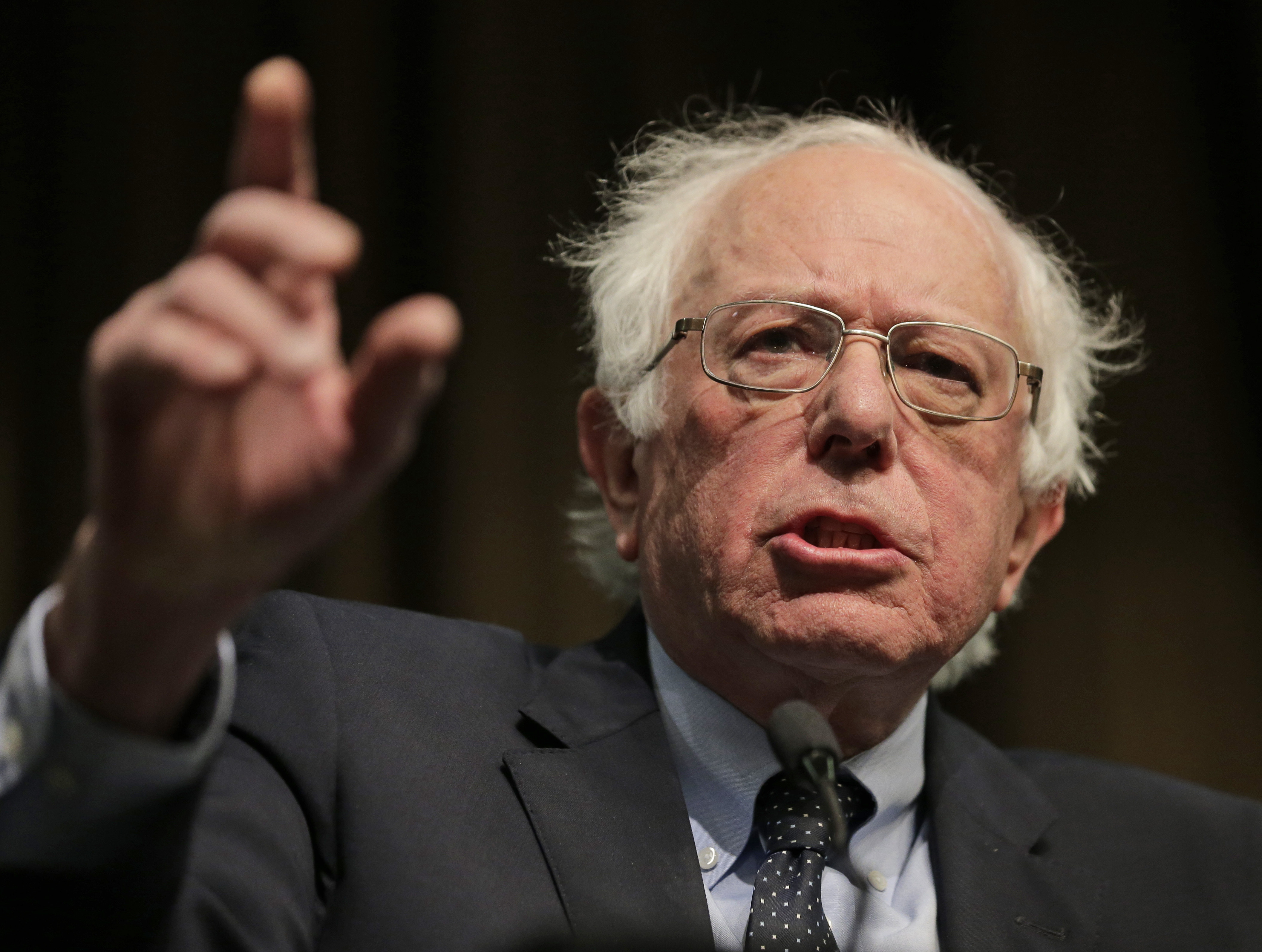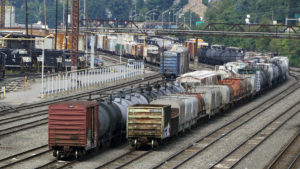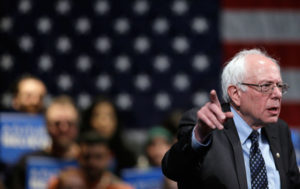Bernie Has to Do Better Than This
The democratic socialist maintains the United States cannot afford to open its doors to the global poor. He’s wrong—offensively so. Sen. Bernie Sanders speaks during the National Action Network Convention in New York last week. (Seth Wenig / AP)
Sen. Bernie Sanders speaks during the National Action Network Convention in New York last week. (Seth Wenig / AP)
On a Sunday in early April, your favorite grumpy Jewish uncle and mine, Bernie Sanders, opened himself up to a renewed line of attack from those within the Democratic Party (and on the political left more broadly) who feel he is out of touch with issues of race and identity. At a public appearance in Oskaloosa, Iowa, a member of the audience asked him about the logistics of so-called open borders, apparently under the mistaken belief that Sanders supported an open borders policy.
The candidate quickly corrected his questioner. “I do not think that’s something we can do,” he said. Instead, Sanders favors “comprehensive immigration reform.” As to open borders, he continued, the world is too full of extreme poverty, implying the United States could not afford to open its doors to the global poor.
It was inelegantly put and poorly framed, although as a matter of policy, it’s not necessarily different from any of the other major candidates’ in the ever-growing Democratic presidential field. Many of the hopefuls have remained deliberately vague on the issue, preferring high-flown rhetoric that focuses on Donald Trump’s stupid wall (which Beto O’Rourke, for example, said he’d tear down), on the gratuitous cruelty of family separation and on the plight of the “Dreamers,” who were brought into the U.S. as young children, and whose condition is therefore considered more sympathetic because they did not willfully violate any American laws.
What, precisely, the candidates would do about immigration—and by “immigration,” our discourse means almost exclusively the immigration of black and brown people from the broadly defined “global south”—remains unanswered. Most, like Sanders, seem generally to support some kind of reform to mitigate the worst inhumanities of the current administration and to provide relief to certain classes of apparently more deserving immigrants, while still leaving much of the architecture of existing American immigration policy in place.
“I think,” Elizabeth Warren recently said, “we need immigration laws that focus on people who pose a real threat.” Who these threatening people actually are is a matter for the imagination, but I’ll give you a couple of guesses. She went on to criticize the administration for “separating a momma from a baby,” which “does not make this country safer.” The notion that the country is somehow unsafe, that the advance of an abstract safety is itself an inarguable political good, is central to Donald Trump’s own border rhetoric, but no one on the Democratic side seems to notice—or care—that they are ceding the argument in advance.
But Sanders has a particularly fraught history with the subject. During his last run, in 2015 he faced similar questions about his immigration positions stemming from his opposition to a Bush-era immigration reform bill. He had opposed that bill because it contained provisions for a guest-worker program, and, as he explained, “There is a reason that Wall Street likes immigration reform. . . . What I think they’re interested in is seeing a process by which we can bring low-wage labor into this county.”
This sentiment—that foreign workers depress American wages or, in cruder terms, that they “take American jobs”—has been an animating sentiment behind opposition to immigration for decades, although in recent years it has been supplanted on the right by pathological obsessions with reproduction and racial purity. Even among more approving liberals of the professional and technocratic class, there is an oblique acceptance that this may be the case; they just think it may be a desirable outcome. Immigrants, they will tell you, are taking the jobs that Americans do not want or are too lazy to do. And there is probably a sense in which this is true: You cannot buy a family pack of drumsticks for just a few bucks if conditions at the packing plant are comfortable and the wages are $15 per hour; the consumer convenience economy we are accustomed to in America requires low-wage, contingent, temporary and other precarious forms of labor.
(There is a convincing case, often cited by libertarians who do favor open—at least, more open—borders, that in the aggregate, immigration increases wages. But that doesn’t obviate the fact that certain industries in certain segments of the economy absolutely do depend on cheap, imported workers.)
Sanders is right to oppose guest worker programs, even if his opposition is grounded in a clunky economic protectionism rather than the more compelling economic and moral argument: that far from being temporary, guest worker regimes seem inevitably to create a permanent underclass of semi-citizens.
But it is wrong to cast the question as an exclusionary choice in which national well-being, economic equality, social justice and harmony require that we keep out the hungry hordes? Aside from an implicit acceptance of the very sort of racist arguments that we reject from the right—that certain types of foreigners are too culturally and economically different to “assimilate” into American society—it also requires that we accept the same bogus economic arguments that Sanders and his copycats reject regarding their domestic agenda—namely, that we just can’t afford it. It assumes a fixed, barely fungible pool of fiscal resources, and it assumes that immigrants inherently and inevitably take more than they contribute. Neither is true, and both, frankly, are offensive.
I generally believe that Sanders is the best we can presently hope for within the rigid, narrow confines of the American electoral system. But on this question, he must be pressured to change. If climate change is the defining issue of our time, as I firmly believe it to be, then its closest human corollary is the free movement of people in the world. It is in some ways the most fundamental human right (and also the most universally violated). To consign any person to a life where they cannot live and work freely, where they cannot afford food and shelter, where, because of the actions of a few industrial countries, they may soon no longer be able to grow food or sustain shelter, is to commit, if only by omission, a crime against humanity.
I wrote previously in these pages that global migration is coming, whether we want it or not, and that the left must ally itself with migrants or surrender to fascism. I sense that Bernie Sanders would simply prefer not to talk about the border. But he’s going to have to. Like the asylum-seekers queuing up at our ports to the south, he simply has no choice.
Your support matters…Independent journalism is under threat and overshadowed by heavily funded mainstream media.
You can help level the playing field. Become a member.
Your tax-deductible contribution keeps us digging beneath the headlines to give you thought-provoking, investigative reporting and analysis that unearths what's really happening- without compromise.
Give today to support our courageous, independent journalists.









You need to be a supporter to comment.
There are currently no responses to this article.
Be the first to respond.